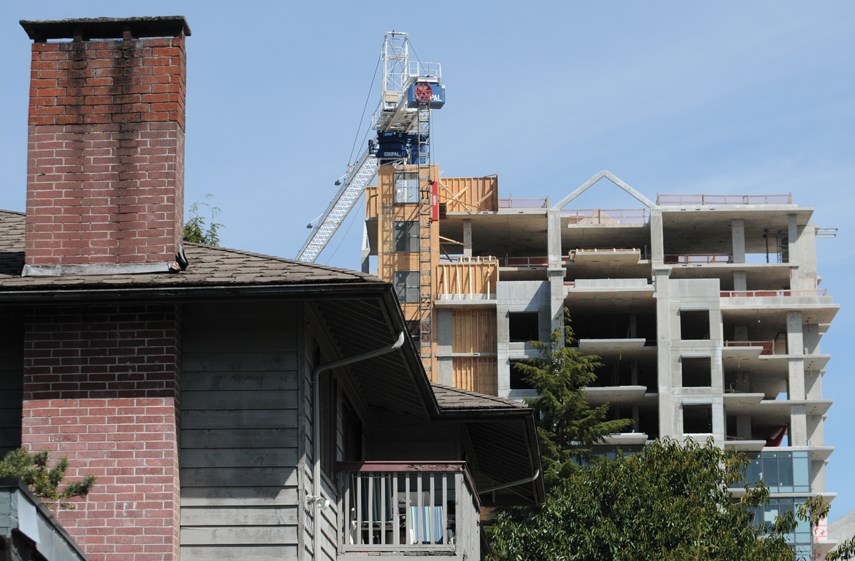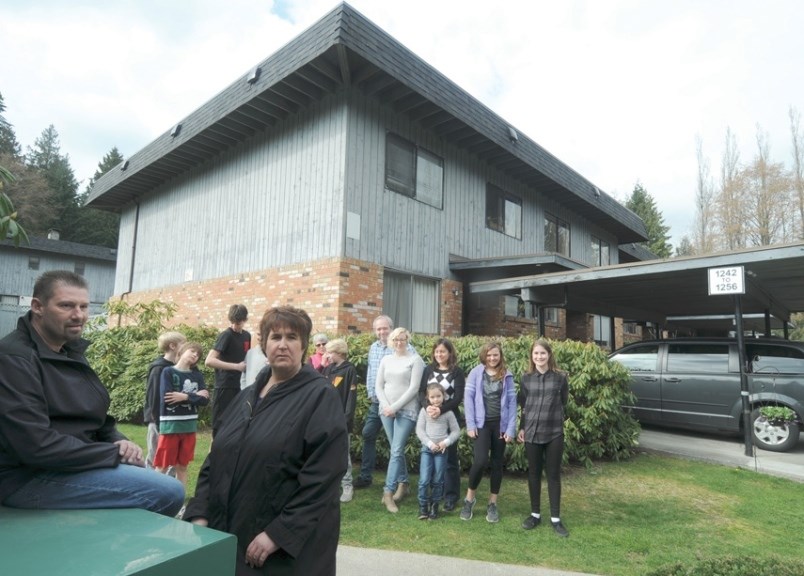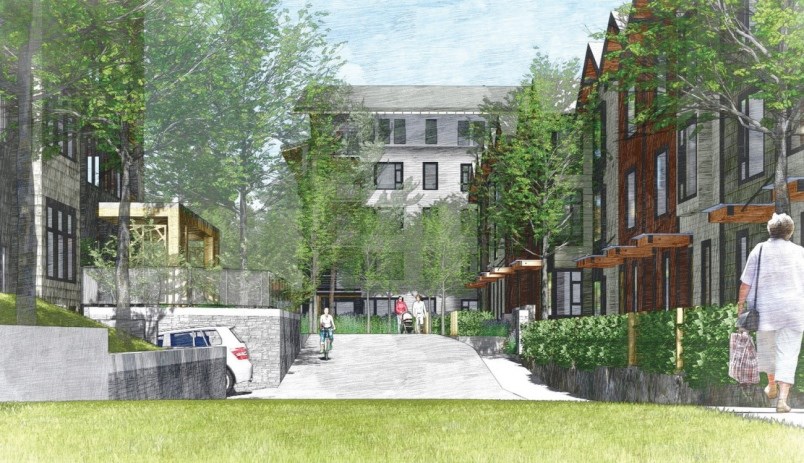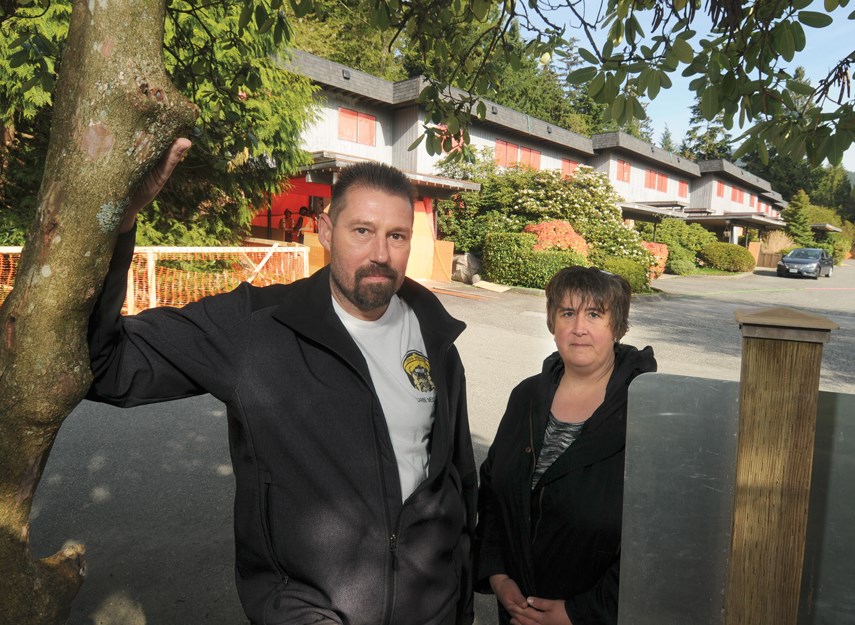The councillors are fighting on Twitter again.
Wielding the satiric hashtag #DoNothingVigorously, Coun. Mathew Bond lambasted the majority of council for rejecting two below-market rental projects.
Coun. Betty Forbes tweeted back, accusing Bond of voting for a multitude of projects that failed to: “build us out of expensive housing or traffic congestion.”
But Forbes’ most blistering response concerned a single vote. Bond, she asserted, supported market development with, “no consideration for [those] who NEEDED affordable housing & were evicted by your decisions/Emery Village.”
In council discussions, Emery Village is the landmark you can see from every window or the leitmotif in an opera. You can’t stop hearing the recurring themes.
Strike 1: Reject 80 affordable homes #delbrooklands
— Mathew Bond (@mrmathewbond) March 21, 2019
Strike 2: Take away for @NSCRConnect Community Housing Action Committee.
Strike 3: https://t.co/jsZMStvgQR
Sad that #NoNewHomes is more important than #AffordableHousing in #DistrictofNoVancouver #DoNothingVigorously
One year later, let’s look at what the rezoning did to the people and politics of the District of North Vancouver.
The decision
The proposal: 411 new units. The price: the demolition of 61 homes.
Failing to provide new housing the young people who hope to live in the district will “drive a nail in the coffin” of those hopes, Coun. Robin Hicks said.
Noting a spate of empty bedrooms, Mosaic senior vice-president of development Luciano Zago called Emery Village: “underutilized.”
In their final deliberations on June 18, 2018, council talked supply and demand, renoviction, and how hard it was for anyone who didn’t buy before property values made their long, fast trip to the stratospheric.
Many Emery residents watched the debate, hoping things wouldn’t turn out like they knew it would.
Walking out of chambers after watching council rezone his home, Terry Wagner said six words the electorate seemed to take to heart: “Be careful who you vote for.”
Election night
“…there is nothing much to do save turn the sitting rascals out and let a new gang in.”
– H.L. Mencken on election day
Confetti. Euphoria. Sixteen years after his first, failed run for District of North Vancouver council, Mike Little was about to be mayor.
For the crowd packed into Canlan Ice Sports, who’d seen bulldozers roll in the wake of a series of 4-3 council votes, it was as if Charlie Brown kicked the football or Wile E. Coyote bought a controlling interest in Acme.
Little and four council allies who spoke against the Emery rezoning dominated the polls, defeating a young, urbanist party in the process.
Amid the revelry, Little singled out Emery resident Kelly Bond.
“Kelly brought all of her neighbours together from Emery Place and started fighting back,” Little told the crowd.
It was Kelly Bond, Little continued, who inspired newly elected councillors Megan Curren and Forbes to run.
Little asked for continued support. “Give us encouragement when you see in the news media that we’re getting beat up a little bit because we take a stance on something,” he said.
“You now have a new council to work with,” Little said.
That night, the cheers were unanimous.

Demovicted
It doesn’t feel like home yet.
Taking her place of honour as the first guest to sit on Terry Wagner’s new couch, Bond congratulates her former neighbour.
“You’ve got the good life here, Terry,” Bond pronounces.
“I don’t know about that,” Wagner calls from the kitchen.
Bond and Wagner agree on much. But where Bond finds a bright side, Wagner is more likely to see shades of grey.
“From what I hear, everybody has now found a place,” she says.
“But lost their community,” he replies.
One neighbour’s off to Squamish, “looking for a job out that way,” Wagner says. One headed to Port Coquitlam. Another to Vancouver.
Nine families that they know of have left North Vancouver.
“One of the seniors, he retired a few years ago, has gone back to work at Safeway stocking shelves on the graveyard shift,” Wagner says.
Bond, a mother of four, moved into a 62-year-old house in Upper Delbrook. She’s paying $800 a month more than she did at Emery. But in this market, she notes, it’s a “pretty killer deal.”
“My youngest daughter is thrilled because this is the first time she actually has her own bedroom,” she says. But her youngest son, who lived at Emery for 10 of his first 11 years, is heartbroken.
She’s had to make a few lifestyle adjustments, which she dismisses as: “first world problems.”
“It’s the single parents. It’s the seniors who are really struggling,” she says.
Sitting on the couch and drinking coffee on an empty stomach, Bond recalls that she made an emotional plea to council exactly one year earlier.
“I feel like I’ve aged 10 years in that time,” she says, offering a wan smile.

For Wagner, who works as a bus driver, it now takes one full paycheque to cover the rent.
Groceries cost more these days. Gas prices and ICBC rates are up. “But the wage doesn’t move,” he observes.
Wagner lives just around the corner from his old home. He remembers the communal parenting. Barbecues. Stocking up for summer with an industrial sized box of Freezies because you couldn’t hand out just one.
The kids were the first to lose their sense of community.
“They had a childhood like I remember on the Prairies,” Bond says. “They ran around like a flock of chickens from sun-up to sundown.”
The decision is “water under the bridge now,” Bond says. Still, she wonders what might have happened if council had taken another look at the letter from the Ministry of Transportation that advised of “ongoing concerns” about the volume of development.
“Would maybe Robin Hicks have changed his mind?” she says. “He might’ve saved his political career.”
It’s a sentiment shared, in part, by Robin Hicks.
Sideline perspective
For Hicks, the political price for supporting the Emery rezoning was his seat on council.
He knew there was anti-development sentiment that grew every time a driver’s blood pressure rose during a traffic jam.
“Admittedly, there was local congestion where development was occurring,” he says. But the reason for those traffic tie-ups is that people can’t afford to live here, Hicks explains.
“I don’t think our development – which was less than one per cent a year – had a material impact on the overall traffic.”
On average, the district population grew by about 1,000 per year from 1966 to 1996. From 1996 to 2016, average population growth was about 276 people per year. In that same period the average number of people in a district household dipped from 2.9 to 2.7.
Asked to re-evaluate his decision on Emery, Hicks is prepared.
“It would have been very easy for me to have been a hero and supported deferring Emery Place.”
But that property could have been transformed into 61 luxury townhouses without any discussions with council, he points out, whereas the new development includes 42 units at discounted rates.
“I would have been betraying my own principles if I voted differently,” Hicks says.
Best-laid plans
Last November, council voted 5-2 to reject 80 units of below-market housing and a seniors respite centre in Delbrook.
For former DNV planner Steven Petersson, that decision set the clock back a decade.
Today, Petersson mainly works as a property developer and a community planning consultant, meaning he spends a lot of time thinking about one equation: “How can I get four votes?”
Council’s decision on Delbrook gave him an answer.
“If they’re going to turn down a non-profit affordable housing with respite care for seniors in a low-rise, on an underutilized parking lot ... they’re going to shoot down everything.”
To an extent, Petersson says he understands why council is still debating last year’s rezoning.
“I do understand the impact that this has on real people’s lives,” Petersson says, noting that his brother-in-law, once an Emery resident, moved to Coquitlam.
But he also wants council to recognize the vulnerable people who could have lived at Delbrook or in the other rejected below-market development at Burr Place.
Working in the District of North Vancouver’s planning department while council was crafting an official community plan, Petersson heard a familiar refrain regarding development: “just wait until the OCP is done.”
And so developers waited. By the time the OCP was complete there was also enough pent-up demand to run through a 20-year land supply in eight years, Petersson says.
The district’s OCP offered the status quo in single-family neighbourhoods and concentrated growth in town centres.
This resulted in a “made-by-policy problem,” Petersson says. But if the district expanded the area where multi-family housing could be built, council wouldn’t be forced to pick between current and future residents.
Despite his criticisms, Petersson says he’d still be willing to work with district council.
“Most people in the development community are quite happy to help council meet their stated objectives – if we just know what they are.”
For former Emery resident Jenn Ohlhauser, watching the new council has been alternately frustrating and baffling.
“They completely campaigned on an agenda that said: ‘We support renters and love the people at Emery Village,’” she says. “They have done nothing.”
Ohlhauser now lives 850 metres from her old home.

“There’s nothing wrong with it, except that it is very expensive,” she says, estimating 65 per cent of her family’s gross income goes to rent.
Next year she’s planning to go from part-time to full-time work. But her primary concern is the next 15 to 20 years.
Some young district residents will get a down-payment sized inheritance from their parents. Some will be gifted their parents’ house. The rest, she warns, will move away.
“If you’re not building rental, where will people live in 15 years?”
Having worked on the OCP implementation Monitoring Committee, it’s an issue in which Ohlhauser is well versed.
She offered a “ton of recommendations” that could help renters – but she doesn’t have much trust that council will move forward on any of them.
A mother of four children including two teenagers, Ohlhauser says she’s beginning to talk to her kids about politics in the district.
“They wonder why people only look at things from their own point of view, they wonder why we don’t consider what it might be like to be like someone else.”
Four more years
Walking past Emery’s boarded up townhomes, Terry Wagner remembers how everyone used to meet in the middle.
“All of a sudden it takes you half an hour to take out the garbage,” he laughs. “These days not so much.”
“It wasn’t the buildings that we were fighting to save,” Bond agrees. “Let’s face it, they’re old. . . It was that community.”
“It’s ghostly quiet,” Wagner says. “I can still feel the life that was here.”
It was gratifying that some politicians recognized the plight of renters, Bond says, explaining that she’s confident council will build what the community needs.
“You might not realize it when you go into a store or you see the guy picking up the garbage . . . but those are the very people that are being pushed out,” Wagner explains.
The evicted residents will have first right of refusal on the homes in the new Emery Village but it’ll likely be another year before they decide if they’ll live there or not.
The new Emery will lose something, Bond predicts.
“Somehow in those chicken coops that you call apartments, people get segregated,” she says. “These type of communities, these purpose-built rental family complexes, are going the way of the dodo.”
When it comes time to retire, Wagner is certain he won’t be able to stay in Metro Vancouver. Right now, he says, the plan is to stay in his new apartment until his son graduates high school.
His new home could be rezoned, Bond reminds him.
This time, taking into consideration the current council’s rezoning reluctance, it’s Wagner who sees the bright side.
“This place is going nowhere for at least four years.”



